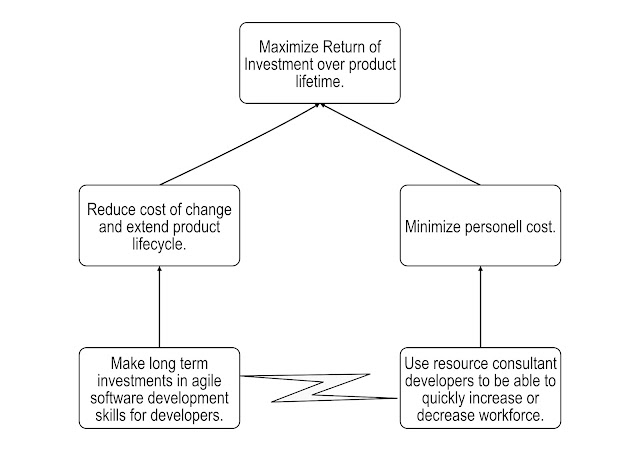Falsification - A gullibility defense
 |
| "When there is no time to think, you cannot think." Quote by Tim, my 9 year old son. Photo: Henrik Mårtensson |
Some of those ideas will be good ones. Once in awhile, very rarely, you will encounter a great idea. Most ideas, however, are bad ones. They range from doing minor harm, to being lethally dangerous.
Unfortunately, our brains are designed to be rather gullible. We tend to believe stuff, even if there is little or no evidence. We tend to believe simple ideas, and disregard ideas that take significant mental effort. However, reality can be quite complex. Simple does not mean true, or even likely. If we want to avoid getting into trouble because of bad ideas, we need defense mechanisms against our innate gullibility.
Some time ago, I wrote about why management models are useful. One of the models I wrote about, the Deming system, lists epistemology, knowledge about knowledge, as a field of knowledge vital to managers. The reason is that epistemology has some excellent gullibility defense tools, or, if you will, tools for bullshit detection.
One of these tools, falsification, provides a defense against a common cause of bad judgement: inductive reasoning. Inductive reasoning is the process of deriving a general rule based on a limited set of observations. Inductive reasoning is inherently uncertain, because it is always possible that if we make one more observation, it would break the rule.
Here is a classic example of inductive reasoning:
All of the swans we have seen are white.
Therefore, all swans are white.
–John Vickers
However, the conclusion that all swans are white can be proven false. Finding one black swan is enough.
 |
| A Black Swan. Photo by Fir0002/Flagstaffotos. From Wikimedia Commons. |
As it turns out, there are black swans in Australia.
This is very interesting if you are an ornithologist, but what if you are a manager?
Well, companies are designed according to rules, There are rules for how to organize a company, rules for how to design processes, rules for what to do, and rules for how to do it, and rules for what not to do.
These rules are rarely questioned, but most of them are "white swan" rules. That is, someone has made a limited set of observations, and then devised a general rule based on those observations. Applying them uncritically can lead to disaster.
Here are some examples:
If you can find a company that implemented Lean without becoming successful, you have falsified the rule.
Toyota did certain things, and was very successful. Therefore, if we do the same things, we too will be successful.In 1948 Toyota embarked upon a complex process of trial and error, and developed a set of tools, techniques, an organisation, and a culture, that worked for them. The end result of that process, without the process itself, is not necessarily what your organisation needs to solve your problems in 2015.
If you can find a company that implemented Lean without becoming successful, you have falsified the rule.
Whatever we make, we can sell. Therefore, items in stock are assets.A basic assumption of Cost Accounting, which was developed around 1920.
Whatever we make is difficult to sell. Therefore, items in stock represent debt.A basic assumption of Throughput Accounting, developed around 1990.
Here you get the opposite assumptions, because the rules have been induced from different sets of observations. You can't pick the accounting model appropriate for you unless you understand which assumption is true for you. Even then, you cannot be certain one of the assumptions is always right.
Whenever I praise people their performance gets worse. Whenever I yell at them, their performance gets better. This is always the case. Therefore, I should yell at people, but not praise them.When a person performs a task exceptionally well, it is likely future performance will regress to the mean. The same thing happens when a person performs a task exceptionally badly. Future performance regresses to the mean. This is just statistics.
The rule above is completely false, and the long time effects are the opposite of what the rule says. See Thinking Fast and Slow by Daniel Kahneman, if you are interested in more details about this example.
However, this observation is one of the underlying assumptions of Scientific Management, and it is related to the idea of enforcing compliance, which is something many companies do routinely.
I used a homeopathic remedy and got well. So did Susan, and Patrick, and Jane. Therefore, homeopathy works.Confusing correlation with cause-effect. Can be caused by apophenia rather than inductive logic.
We increased cost effectiveness, and profitability increased. We increased cost effectiveness again, and profitability increased again. Therefore, we should always increase cost effectiveness.Works only up to the point where reduced capacity costs are balanced by increased queueing costs.
All of these rules are either completely invalid, or valid only under certain conditions. Working out a better mental model can be difficult. For example, working out a better rule than "increasing cost effectiveness will always increase profitability", or "homeopathic remedies work", requires a fairly sophisticated understanding of mathematics, in the fields of queueing theory, and mathematical variation respectively.
However, finding a clue that something is wrong with these ideas is much easier. If you can find a single instance where the rule did not work, then the rule is under suspicion. That is falsification.
Here is the essence of falsification:
Falsification can be a powerful defense against management cargo cult, but also against pseudo-science, racism, sexism, idiotic legislation, empty election promises, propaganda...
If you can express something as a falsifiable statement, you can test it. Falsification won't tell you what is true, but it can clue you in to what is false. This makes falsification an important tool for distinguishing between facts and false beliefs.
Here is the essence of falsification:
No matter how many observations you make that confirm a rule derived from inductive reasoning, the rule may still be false. You need only make one observation that does not fit the rule, to prove the rule wrong.Thus, if you can find an instance where a company could not sell what they had in stock, or could sell what they had in stock, or a case where someone was praised, and went on to do something very well, or was yelled at, and still continued to perform badly, or used a homeopathic remedy that did not work, or a company that increased cost effectiveness without becoming more profitable, then you have managed to falsify at least one of the rules above.
Falsification can be a powerful defense against management cargo cult, but also against pseudo-science, racism, sexism, idiotic legislation, empty election promises, propaganda...
If you can express something as a falsifiable statement, you can test it. Falsification won't tell you what is true, but it can clue you in to what is false. This makes falsification an important tool for distinguishing between facts and false beliefs.




Comments